Ask a random Freemason the purpose of Freemasonry and the likely response will be to “make good men, better”.
Research undertaken by James Justin Davis Pennsylvania Academy of Masonic Knowledge
It is a fair answer when followed on by the brother’s personal view of what that means but to so many Freemasons the world over this statement varies quite often and to some is hollow. In a questionnaire conducted this past week, of which 128 brethren gave their opinion on the matter (Davis, 2020), opinions seemingly hit on three main points.
This article explores the answers left by these brothers in the Craft; furthermore, the paper seeks to expand on these answers by offering tools that can be utilized in lodge to expand on what they would like to see within Freemasonry after the receipt of the Sublime Degree of a Master Mason.
Generally, the path to Freemasonry is a rather short one, ranging anywhere from a one-day class to even years before a brother is raised to the Sublime Degree of a Freemason.
Usually, this is constricted to less than a year though, with the third degree being a very important undertaking that leaves quite a lot of questions in the newly raised Master Masons mind.
These answers are generally left unanswered and what we see established is a group of brothers blindly leading other brothers through stated meetings where the focus of the meeting is the minutes of the prior meeting.
This is not to say the brothers are unintelligible, but rather have not been directed to resources abound that would better prepare them to instruct others in the ways of the craft.
In my own experience, having visited multiple lodges in both the United States and Ontario, Canada, these meetings are broken down into payment of dues, payment of bills, a vote on the minutes, and possible Masonic short talks.
This likely leaves a new brother to ask one of the following questions:
Is this what Freemasonry is about?
Has it always been this way?
Will it always be like this?
The answer to all three questions is no. Freemasonry is an evolving fraternity, sometimes for the better and sometimes for worse. Just as our rituals have changed since their inception so have our priorities.
In the 17th and 18th century not all lodges met regularly, with some only meeting for the conferral of degrees on new initiates.
During the late 18th century and early 19th century, we see a fraternity flourishing with enhanced rituals created by Brothers Thomas Smith Webb and William Preston.
These two, and many others emphasized the first three degrees as well as the rest of the York Rite, [yourkrite.org] creating an expansive and more explored narrative to the Masonic story, accompanied by lectures for each degree emphasizing not only historical points derived from the Holy Bible and Flavius Josephus’ Antiquities of the Jews but with moral lessons laced throughout.
These prior and interim lectures, and their authors, are seemingly becoming lost to history but, based on the poll data received, Brethren want them back.
Respondents were allowed to write what they believe the fraternity’s involvement is in “making good men, better”, and the results can be quantified into three categories: Masonic education, Brotherhood, and Moral lessons from the degrees.
Masonic Education is likely one of the most important aspects when entering our doors.
Rather it is a historical analysis of where Freemasonry has arrived from, the Masonic legends, or factoids concerning various men who entered our ranks all Brethren seek to have a working knowledge about that, which they enjoy.
A lodge is not limited to what is discussed as Freemasonry spans quite a lot of ground, covering a large expanse of history, philosophy, and sciences. Furthermore, lodges must realize that every lodge is a research lodge.
While this paper acknowledges the difficulty of the task, given Freemasonry’s sparse historical documents, it is also realized this is not the first time a researcher has encountered this dilemma.
The Roman Republic did not start recording history until at least 300 years after Etruscan rule, thus creating over 500 years of lost philosophy and history to recover.
Such a monumental task seems impossible, yet historians such as Polybius rose to the task to recover these histories. Other historians, such as Herodotus, sought the past out and write on it in such a way it would provide moral lessons to his readers.
Fraternal Friendships polled second and are indicative of the necessity to have close relationships to those we sit in lodge with.
The lodge is much more than a place to conduct business, it presents a forum for all brethren to voice their opinion.
Discussions should be had within the confines of a tyled lodge for all the brethren to participate.
Discussions should also be had outside of our doors, and it is incumbent upon the men of the officer line to ensure this happens; be it on a website, a group chat, or even platforms such as Facebook, Skype, and Google.
There are quite a lot of mediums available to facilitate a healthy discussion that transcends the time allotted for a business meeting, and from these discussions, one can get a feel for where the lodge is and where it should be taken based on the brethren.
Historically, Freemasonry grew out of smaller towns where many of its members knew one another because they could be found within the same square mile; this is no longer the case as members travel an hour or more to attend lodge and would otherwise likely not see their brothers outside of Freemasonry’s doors.
Officers should make the effort to reach out to its members, especially those without families, to ensure they know that they are a part of a brotherhood that operates both within the confines of the Masonic Temple, as well as outside of it.
This is especially true concerning the current COVID-19 pandemic that has swept our nation and forced the closure of our doors.
Lastly, the third highest in the poll was to teach and expand on the Moral Lessons embedded in the degrees.
Unless one is a fast learner and a deep philosophical thinker it could take an immeasurable amount of time before they understand the underlying lessons in each of the three degrees and those degrees that lay beyond.
This deeply rooted philosophy sits at the center of why Freemasonry exists, to go beyond simple historical narratives and strike the initiate at the philosophical archetypes that comprise each of us (Golden, 2020); these rituals tug on the consciousness of the initiate forcing him to face himself, exposing and dealing with his character archetype so that he can better himself.
Symbology within Freemasonry is aimed at exposing and combating these archetypes.
The “Point within a Circle” is a prime example of centering oneself between the archetypes of the hero (St John the Baptist) and the sage (St John the Evangelists).
Expanding on these symbols and breaking them down to their root science is the essence of philosophical thought and a key element to understanding the degrees.
Through reading and instruction, Brethren will find several interpretations of the degrees to include representing the various stages of life, with deeper implications alluding to the story of the ineffable soul.
Brethren joining our ranks seek the furtherance of these three major areas, amongst other minor ones, according to those polled.
Therefore, it is incumbent upon all Brothers to seek the furtherance of education for not only their enlightenment but that of their fellow brethren.
Secondly, through taking these actions one may further seek to redefine the stigma associated with the “Stated Meeting”, which has been stigmatized, by many, as the “meeting of minutes”.
In this next section let us propose several ideas that address these issues among others.
On the topic of general education, one can seek a variety of topics to include the history of Freemasonry, rather it is on the topic of Solomon’s Temple or the Legends of Freemasonry as understood by Mackey or Gould.
There is an entire world of literature and history that surrounds Freemasonry that addresses the curiosity of the brethren.
A well-orated lecture on the history of Grand Master Nimrod and Brother Mason Noah would undoubtedly bring up much debate, which is at the center of any good Masonic topic.
Education is not limited to Masonic related subjects, however, as the orator can broaden the research and look into explaining the various zodiac symbols that are depicted within certain Rites of Freemasonry, or expand on the area of the Seven Liberal Arts and Sciences, such as Astronomy, explaining how to locate the North star when lost, as well as the origin of the seven stars in Masonic depictions.
One often overlooked aspect of education is simply making it available; the establishment of a library available to members of the lodge would provide an immeasurable impact.
Given the current situation in the United States, previous education given in the areas of communications equipment such as amateur radio, or in prepping or rationing of supplies could become an invaluable tool for every brother of the Craft.
All these topics and so many more will serve to make men, better.
Regarding Fraternal Relationships, one can only look to broaden the scope of activities both inside and outside the lodge. Inside the lodge, the Worshipful Master and Wardens should encourage discussion while in tyled sessions.
They should foster a climate where brethren feel free to speak up during educational lectures or votes. While outside of the lodge the Worshipful Master and Wardens should seek events that bring the brethren together.
LaFayette Lodge No. 199, in Lock Haven, Pennsylvania, met together at an establishment called the Hatchet House, where they spent time with both each other and their wives to build a cohesive relationship with one another and bring their spouses into the fold.
This is important to the fraternity because it transforms the lodge from a place to a state of being. It is important to remember that the lodge is not a place, it is a people.
The lodge should no longer be a place to discuss business, as in the past. Rather, it should become any place three or more Master Masons come together to be among one another. These can be organized events that are planned months out or can be a spur of the moment ideas.
It should also include the families; The term “Mason” should not describe solely the individual, but rather the entire family; spouses are not new to Freemasonry, as several side orders such as the Order of Eastern Star, and Heroines of Jericho, have shown us.
Lodges must look past the stated meeting and seek the informal to furnish the fellowship necessary for a healthy lodge, and again to make men, better. One thought given the current state of affairs may include use of the Internet and applications such as Skype, FaceTime, or Facebook Live.
Lastly is the imparting of Moral Lessons that come with the degrees.
To continue this, various efforts should be directed to expound on them and explain the implications of the teachings; while not all Masons will agree on every moral implication in a given degree, all will agree each degree holds several moral implications.
It is important that brethren not simply learn their oaths, or a particular catechism, but rather can explain the importance of the degree from the historical to the archetypical. Once again, all lodges must act as a Research Lodge.
To that end, every brother is a researcher of Freemasonry. We are not simply an empty husk with a title, we are a charged soul well learned in matters of Freemasonry, lest the title is empty.
It is arguably more important to understand the reasoning behind each degree than it would be to accurately recite, in full, the catechisms and ritual.
Lodges, therefore, should seek to appoint a brother whose task is education about the degrees, teaching the invaluable lessons contained within, and expound on them so that each degree can connect with each initiate and their life.
In conclusion, there are multiple ways to make good men better. Each man must define for himself how he will become better, but the collective lodge should seek to aid and assist the individual in that laudable pursuit.
Lodges, through instruction on Masonic and non-Masonic education, can strengthen the Craft, with Fraternal ties being strengthened those members seeking fellowship will have reason to come back, expanding on the moral lessons taught into the degrees and providing a true basis for members to meet on the level.
References:
Davis, J. 2020. Questionnaire: Making Good Men, Better. Retrieved from:
https://docs.google.com/forms/d/1l831o6G0Y2GHjPocu-mAmF-SxIPghb1L8vcGBYg2ZkI/edit
Golden, C. 2020. The 12 Common Archetypes. Retrieved from:
http://www.soulcraft.co/essays/the_12_common_archetypes.html
Article by: James Justin Davis
James Justin Davis
Ivy Lodge No. 106
District 18, Grand Lodge of Pennsylvania
Williamsport, PA, USA
Recent Articles: membership
 A Rose by any other Name may not be the same Explore the profound distinctions between conferred and transmitted Masonic degrees with Bro. Scott Wisdahl. Delve into how presentation quality, personal impact, and setting shape these rituals, and consider the potential for digital adaptations in modern Masonic practices. Join the discussion on enhancing the Masonic journey and preserving its essence. |
 Progression through the Degrees; a Rite or a Privilege? Exploring the layered journey of Freemasonry, Matt DA Fletcher probes the essence of progression—whether it's a mere rite or a privileged path. Delve into a nuanced perspective where every degree is not just a milestone but a fraction of a grander continuum. |
 Quantity vs Quality within the world of Freemasonry Dive into the compelling debate of quantity vs quality within the world of Freemasonry. Discover the transformative focus on attracting members aligned with the institution's values, promising not only growth but quality growth. High-value individuals assure sustainable development with their commitment to serving the brotherhood. |
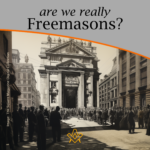 Maybe Freemasonry has opened its doors too wide. Perhaps some have not understood that the survival of Freemasonry in order to achieve its sublime purpose lies not in the number of members it has, but in their quality. Maybe we need less members and more Freemasons. Less men in Freemasonry and more Freemasonry in men. |
 What is ritual and why is it important? P1 Delve into the profound world of Freemasonry rituals and their significance. This insightful piece unravels the underlying importance of rituals, their impact on participants, and the transformative power they hold. Uncover why these centuries-old traditions remain integral to Masonic practice today. |
 Could Freemasonry be helpful for young men? Unravel the Masonic Brotherhood: Could Freemasonry be the antidote to modernity's challenges for young men? Dive in as we explore the Masonic world, its principles, camaraderie, and how its traditional rituals could help forge stronger identities in an increasingly complex world. |
 Discover the remarkable benefits of Lodge Meetings on your well-being. From fostering connections to combating stress, learn how these male-oriented gatherings offer an antidote to anger, hunger, isolation, and exhaustion. Dive into the power of shared experiences, understanding, and camaraderie. Your key to improved mental health awaits inside. |
 Tutorial for a Worshipful Master Unlock the Secrets to Leadership Mastery in our Worshipful Master's Tutorial! Brother Antonio Biella shares step-by-step guidance for Masonic Lodge leaders on honing their roles, duties, and future vision. Discover how to drive growth and engagement in your Lodge, setting ambitious goals and inspiring member participation. |
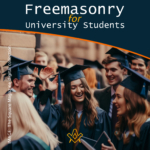 Freemasonry for University Students What are social skillset challenges facing students when they graduate from university ? |
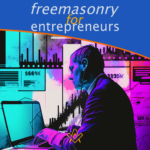 How the Core Values of Freemasonry; Brotherly Love, Relief and Truth Can Be Applied to Improve Productivity For Entrepreneurs |
 Why I became a Freemason: a personal journey of self-improvement Salik Tariq shares his reasons for becoming a Freemason – a journey of self-improvement, finding a community, and personal growth. |
 Freemasonry: Coming out of the Cloisters This paper examines the fundamental tensions on the lines of religion, gender and political ideology that exist in some jurisdictions of Freemasonry. It is on the first of these, religion, on which he makes an initial and exploratory focus. - by Gerald Reilly |
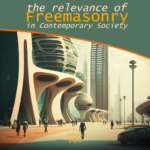 The Relevance of Freemasonry in Contemporary Society The role of Freemasonry in contemporary society is an indispensable one. Despite the challenges and misconceptions it faces, the organization remains steadfast in its humanitarian pursuits and commitment to personal growth and self-betterment. Through its efforts to evolve and adapt to the changing needs of its members and the world, Freemasonry continues to be a vital force in shaping a better future for all. |
 Has Freemasonry managed to revive and thrive after the darkness of the Pandemic? Robert Lomas gives us some (promising) insights. |
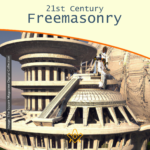 21st Century Freemasonry – a Sign of the Times? A recent article in The Times of London highlighted the dilemma 21st Freemasonry is facing. In this article one Master Mason shares his views of the strengths, and the challenges of modern Masonry. |
 A concept that is both based on our Freemasonic rituals and what we understand as teamwork. This article by Chris Batty examines why teamwork in the lodge is the network that binds us. |
 Lebanese Freemasonry has been both witness to and sometimes participants in turbulent events and forces, which shaped and influenced their world. |
 Is a Masonic Tradition Necessary? Dealing with Masonic tradition is a complex subject that requires careful analysis in order to reach a balanced point on the best etymological definition and the set of discourses and practices, which often end up being presented as such, without, however, presenting bases that support them, often serving only as a discourse that restricts and controls the masses. Fernando Rodrigues de Souza debates this complex subject. |
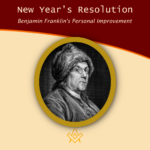 New Year's Resolution with Benjamin Franklin's Personal Improvement Are you ready for a new year's resolution challenge ? To accomplish his life’s goals, at 25 ( around 290 years ago ), Benjamin Franklin developed and committed himself to a personal improvement program that consisted of 13 virtues. You are invited to join me in practicing his daily routine for 2023. |
 The Alberta Masonic Higher Education Bursary Fund is to help the next generation of Albertans, our children and grandchildren, to obtain the education they need to lead successful lives and contribute to the welfare of mankind. As you can see from this little lesson of our history, education is truly a Masonic obligation. |
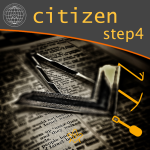 To be a Better Citizen of the World: Step 4 A value proposition for Pure Ancient Masonry as defined in terms of Citizenship; the allegories, symbolism and lessons are a blueprint for all Freemasons to be a better citizen of the world. |
 To be a Better Citizen of the World; Step 3 A value proposition for Pure Ancient Masonry as defined in terms of Citizenship; the allegories, symbolism and lessons are a blueprint for all Freemasons to be a better citizen of the world. |
 In connection with recent article about Freemasonry in the metaverse, we look at how an Egregore applies to Freemasonry in a digital world |
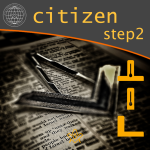 To be a Better Citizen of the World; Step 2 A value proposition for Pure Ancient Masonry as defined in terms of Citizenship; the allegories, symbolism and lessons are a blueprint for all Freemasons to be a better citizen of the world. |
 There are many brotherhoods in the world, and Freemasonry is one of the most significant and successful of them all. This article will be the focus two questions: the importance of brotherhood ? and is there room for improvement in Freemasonry? |
 Intergenerational relations in Masonry: challenges and possibilities Backed with scientific research, Professor Luiz Neto and Professor Alexandre Braune investigate the Intergenerational relations in Freemasonry and explores the challenges and opportunities. |
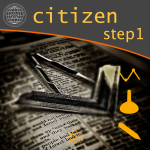 To be a Better Citizen of the World; Step 1 A value proposition for Pure Ancient Masonry as defined in terms of Citizenship; the allegories, symbolism and lessons are a blueprint for all Freemasons to be a better citizen of the world. |
 The Masonic Temple is a platform where both Freemasons and non-Masons, enthusiasts of real art and spiritual growth, connect to the new world of the metaverse. A Freemasonry in the metaverse project, based regular freemasonry principles. |
 Opportunity to fix the Sussex fudge Is there a value proposition for members, that under English Constitution Freemasonry, we have a 4 part offering; Entered Apprentice, Fellowcraft , Master Mason and Companion, conducted in a single craft lodge ? |
 Value Proposition of Freemasonry In addressing declining lodge membership and lack of attendance, we need to assess the value it offers to members. What is value, and what does it mean to you? |
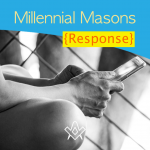 What is a 'Millennial' and what do they want from Freemasonry? You'll be surprised at the answers. |
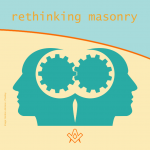 Let us help answer a fundamental question, from a confused newly raised brother asking “What does it all mean and where do I go from here?” |
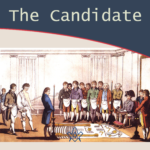 Written in 1930, much of the advice is still relevant today - although some may provoke further thought or debate! |
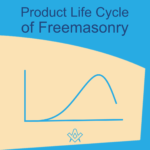 Product Life Cycle of Freemasonry An inconvenient truth about the product life cycle of Freemasonry |
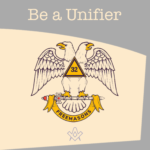 Freemasonry is local. This is where we need to start. We start with our Facebook friends, our neighbours, our colleagues, our lodges… |
 Freemasonry in the time of pandemic The Rule of Six. Localised lockdowns. Second wave? What do we do now?! The answer is simple - engage with members, promote Masonic education and get thinking outside the lodge. |
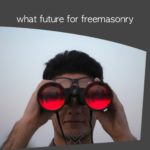 The current functioning of the Masonic movement has some positive aspects and others that are blatantly backward and counterproductive. |
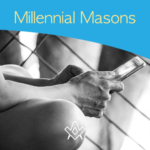 What is a 'Millennial' and what do they want from Freemasonry? You'll be surprised at the answers. |
 How to improve your Lodge Membership Marketing Program. |
 The Anti-Social Impact of Social Media The 'dark side' of social media and its negative effect on our mental health |
 If Freemasonry cannot meet, is this an opportunity to make a change to how we do things? |
 Has your lodge accepted an unknown candidate from the internet? Third in a three-part series looking at the process to accepting candidates via the internet |
 Is the brother of a brother a brother ? Rights to visit - recognition and regularity re-evaluated. |
 The second article in the Unknown Candidate series - Outlining the social media marketing process to attract the unknown candidate to make that first enquiry |
 Ask a random Freemason the purpose of Freemasonry and the likely response will be to “make good men, better”. Research undertaken by James Justin Davis Pennsylvania Academy of Masonic Knowledge. |
 Has your lodge accepted an unknown candidate from the internet? First in a three-part series looking at the process to accepting candidates via the internet |
 Mental Health - Raising its awareness and how we as Freemasons throughout the entire UK can help our fellow brethren and their families when they need it. |
 Share one thought why freemasonry is relevant today - Open question posted on Facebook with a very wide range of responses from Brethren across the globe |
 The Tipping Point of Freemasonry Why do brothers lose interest in Freemasonry and what can we do to get that spark back? At what moment did our own thoughts begin to waver? |
masonic knowledge
to be a better citizen of the world
share the square with two brothers

click image to open email app on mobile device








